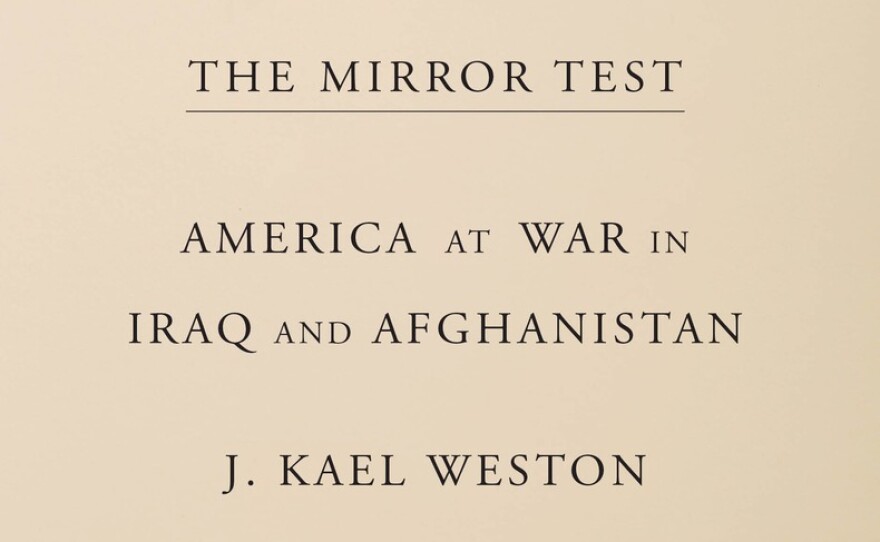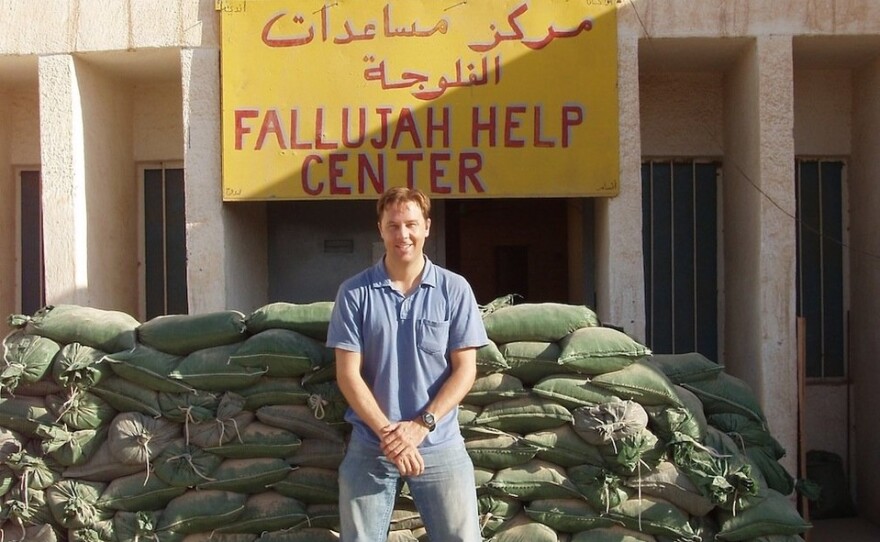This is KPBS Midday Edition, and Maureen Cavanaugh When a patient severs a disfiguring wounds, this moment called the mirror test when patients confront the new reconstruction appearance. That's what America needs to do to fully understand the way the wars in Iraq and Afghanistan had changed us. As a statement department political advisor, he saw firsthand the horrors of war and the unrealized hopes of the Iraqi and Afghan people. He has written a memoir detailing his x-rays. The mirror test. Welcome. Thank you. You say you are against America's invasion in Iraq back in 2003. You call it the wrong war. Why did you want to get closer to the battles? You sometimes need to go where your needed, not necessarily where you would prefer to be. I believe I had something to offer in Iraq based on my work at the US mission to the UN. Even though you are against the war, you're asked by military officers and regular Marines frequently if the war was worth it. What did you tell them? There was never an easy answer to that question. The longer we were in the Iraq war, particularly in western part of the country, we all had a reckoning about how badly things were going. I was a policy guys the hardest part for me was to try and square the policy with the sacrifice and as a sacrifice went up, the policy seemed more and more hollow. What did you tell them? For a while, I told them we are where we are and we will do the best we can to survive and handoff a rock as best we can to the Rockies. I never had a here's why it's worth it, here's way our government sent us here. I think that was hard part of my job because as the political guy, the political plan should have been driving the tactics and when we had elections, it was Marines who had the most online along with the voters who actually showed up. That brings us to the incident in Iraq that sticks with you most deeply. It's the 2005 helicopter crash that killed 31 servicemembers, the single largest casualty incident. It was your lobbying that put them on that helicopter. Correct. We had a couple of options and preparing for the election and the Marine leadership led by the General. Zero the General. 0182 the General. 0182F gatekeeping juice focus in Falluja. And my bosses wanted to have more polling sites open for more Rockies. The tragedy happened and I regret the decision. How if you are the victims of that crash? I promised I would go try to get to know a little bit about each one. It has been happening in 2001 five. It's been 11 years a teacher I tried to go to at least one come sometimes to. I like to see their hometowns, where they are buried and while I do that, I built a certain websites and learn their stories. That has helped me personally but I hope the families overtime have been able to manage the loss better. I understand you've only visited the families of one of the Marines. Family here in San Diego. Oh satellite? It was a difficult meaning. We met in San Diego and have a long dinner. I chose not to write about it and probably will choose not to go into detail because I think it's personal. His mother did not want to meet and I think that's understandable that his father and his younger sister did. She was much more forgiving than I would have been. This is obviously, it's a heavy burden. What truth about these wars do you think America needs to face? I think we need to be honest. The mirror is unflinching and that's what I did. He was badly wounded for a lot of us it's easy the war's changes as a country and the sooner we have a reckoning, the more proportionate it is to the Marines and the soldiers who sacrificed the most. I think their voices and stories have lost in the year since 2001. Is any of this political dialogue addressing the consequences of these ongoing wars? Very little. I think the US deserves better from our political discussion when we are determining who should be the next commander in chief. I think it's time to think hard about who will be sending our Marines and troops into harm's way and is that person, whether it's Hillary Clinton or Donald Trump worthy of that sacrifice. I have strong views on that but I probably should keep them to myself. You can hear more from him. He'll be signing his book, the mirror test. J. Kael Weston, author, "The Mirror Test: America at War in Iraq and Afghanistan" Tomorrow at the camp and Senate record exchange. Thank you for speaking with us. Thank you. I'm grateful for the opportunity for cost Acca -- for the opportunity.

When a patient suffers a disfiguring wound, there's a moment called the “mirror test,” when patients confront their new, reconstructed appearance. With the way the wars in Iraq and Afghanistan have changed the U.S., that's what America needs to understand, diplomat J. Kael Weston says.
Weston served as a U.S. State Department political adviser in both countries from 2003 to 2010, working closely with the Marines to forge alliances with local leaders. He has written a memoir detailing his experiences called "The Mirror Test: America at War in Iraq and Afghanistan."
Weston also played a role in a 2005 mission that led to the largest casualty incident U.S. troops suffered in either war. In the run-up to the 2005 Iraqi elections, the military wanted to secure polling locations but was divided between focusing on large cities including Ramadi and Fallujah or less populous Sunni-controlled areas. He convinced the generals to send soldiers to the more remote locations.
A helicopter transporting troops to the polling sites crashed, killing 30 Marines and one Navy corpsman. Weston vowed to visit all of their graves, but has only met with one soldier's family: Marine Mourad Ragimov from San Diego.
Weston joins KPBS Midday Edition Thursday to discuss that meeting and share his first-hand experiences of war.







